READER COMMENTS ON
"GOP Obama Supporter Proposes Prop 8 Compromise: Civil Unions for All, Leave 'Marriage' to Churches"
(35 Responses so far...)
COMMENT #1 [Permalink]
...
Alan D
said on 11/21/2008 @ 1:13 pm PT...
I've been told this is impossible anytime I mentioned it, but I think it's an outstanding idea. Everyone wins. Religions may 'marry' whomever they please. The state will recognize its civil unions without discrimination. Now if we could just get the federal government to go along with it...
COMMENT #2 [Permalink]
...
Paul McCarthy
said on 11/21/2008 @ 1:26 pm PT...
This "compromise" takes a bad situation and makes it worse. There is no guarantee that civil unions will be recognized as "marriages" outside of California for the usual purposes (tax laws, inheritance, etc.) Couples (whether same sex or not) would have to ask permission of some church in order to marry, putting the churches back in the exclusive business of determining who is and who isn't allowed to marry.
COMMENT #3 [Permalink]
...
Chris Hooten
said on 11/21/2008 @ 1:39 pm PT...
For Christ's sake, why don't they just let the homos get married. Religious nuts. Sheesh. I guess they do call us the land of fruits and nuts, eh?!!
COMMENT #4 [Permalink]
...
Dex
said on 11/21/2008 @ 3:59 pm PT...
The government needs to step out of the marriage issue as a matter of religious freedom, equal protection, privacy and freedom of speech.
It is oppressive how many of our rights Prop 8 invades. I'd be interested to know how many legislative proposals ever codified the legal use of a word in common speech. Under this compromise proposal, allowing Prop 8 to stand amounts to limiting freedom of speech. Call it what you want, but you can't call it "marriage" if it doesn't fit the state definition of marriage, even though the state would no longer be sanctioning marriage.
The idea of the compromise sounds good - government should not be in the business of marriage, it is primarily a religious entity, and therefore, "no laws shall be passed..." But the compromise still allows the government to dictate the use of speech. And, it still sidesteps the equal protection issue with regards to broader recognition of the civil union.
The worm has turned. If the state supreme court doesn't overturn prop 8, the people will in a few years, anyway. The facts are laid out, it always just takes people a little while to realize when things have changed.
COMMENT #5 [Permalink]
...
Ancient
said on 11/21/2008 @ 8:24 pm PT...
I just want to know where is the voting fairness?
All people be WELL.
COMMENT #6 [Permalink]
...
NewConstituionalConvention
said on 11/21/2008 @ 11:02 pm PT...
Paul @2, have you ever heard of the Universal Life Church? They're down with gay marriage and pretty much anybody can be ordained and perform the ceremony. Even you could start performing "marriages" and it would be all legal beagle.
COMMENT #7 [Permalink]
...
MJHolt
said on 11/21/2008 @ 11:07 pm PT...
Ninth amendment:
“The enumeration in the Constitution, of certain rights, shall not be construed to deny or disparage others retained by the people."
I think that this right needs to be invoked.
COMMENT #8 [Permalink]
...
Kira
said on 11/21/2008 @ 11:19 pm PT...
Does common law marriage not apply to same sex partners? If not, why not?
COMMENT #9 [Permalink]
...
Kira
said on 11/21/2008 @ 11:41 pm PT...
My comment #8 is probably dumb.
I DO NOT WANT a Theocratic Government. People need to understand we will become like the fundamentalist Taliban if we keep going in this direction.
COMMENT #10 [Permalink]
...
Kira
said on 11/21/2008 @ 11:58 pm PT...
I personally always felt that the marriage license from the state was for the laws of the government and the ceremony performed by the Pastor [or Priest] was the religious ceremony of personal choice.
So - isn't that really the way it is? That is until the crazy fundie/evangelicals started making outrageous claims & stirring up fear among the silly sheep.
I hope this will work out decently - I'm pretty darn sick of rightwing fundies who have completely lost and/or distorted Christ's message.
COMMENT #11 [Permalink]
...
neomonkey
said on 11/22/2008 @ 6:24 am PT...
It's always seemed to me that marriage, more than any other slice of life, has been the major thoroughfare/pathway by which religion has transversed to stick its insidious tendrils into the guts of secular governmental operations.
I think the compromise solution is cosmetically awesome, it's what I've pretty much railed about for years. Unfortunately, Jane and John Christianity will not, can not, see "marriage" and "civil unions" as separate entities. The presumptive aim of religion seems to be that of slathering its Medieval notions of marriage on the citizenry (regardless of race or creed) rather than simply on its own congregation. And of course, the secular conservatives who also march lock, stock and barrel to their Party's fundamentalist jive.
COMMENT #12 [Permalink]
...
Bob In Pacifica
said on 11/22/2008 @ 7:53 am PT...
Would a civil union, or whatever it would be called, be recognized as a marriage for tax purposes, etc., in the rest of the country, and in the eyes of the federal government?
That would be my major concern.
Also, would all the fundies who thought that they'd been married suddenly find themselves not "married" but just civily unioned and thus destined for Hell? Or, on the other hand, would the churches all be happy that everyone would have to be scheduling marriages to be religiously married under the new law?
It sounds like a nice compromise, but I'd like to hear what the leaders of Prop H8 have to say. Anyone with an IQ above room temperature knows that getting married at city hall isn't the same as getting married in your church. Somehow I think that the haters wouldn't be satisfied with this.
How about if we're really about equal protection under the law, and if one group of citizens can't marry, then how about no one in California be allowed to marry? If nothing else, the H8ers will quickly come up with reasons why they should be allowed to marry.
COMMENT #13 [Permalink]
...
Agent 99
said on 11/22/2008 @ 11:40 am PT...
I still haven't figured out why any American thinks the state has any business issuing marriage licenses. I don't know what authority God or clergy have in the matter either. No paper makes it legitimate and no deity makes it real. No ceremony ever held was ever the thing itself. No contract ever signed bound a person of bad faith. The laws and traditions do extremely little to protect children of these so called "marriages" and certainly not more than they could do without the dumb licenses and rituals. I sure wish we would all grow up and use our energy stopping the criminals who run this place.
COMMENT #14 [Permalink]
...
neomonkey
said on 11/22/2008 @ 2:41 pm PT...
I suppose all contracts are just "paper" and essentially unbinding in the broader scheme of insignificant human existence.
I suppose in a marriage contract there is very little leverage placed upon forcing the parties to abide by its "fine print". It's much more difficult to flee an auto loan than a marriage.
COMMENT #15 [Permalink]
...
Helldigger
said on 11/22/2008 @ 6:08 pm PT...
California voters spoke, but the GLBT community isn't listening.
Arizona voted to make the needed constitutional change for one reason only. To Keep rogue justices from legislating from the bench.
The California bench forced this vote by doing exactly that. Federal DOMA law means nothing to judges with whims who want to create havoc.
The voters have spoken and bleeding hearts can't stand it.
31 States now have constitutional language to keep marriage what it is, the union of bride and groom as man and wife.
Anything else is irrational.
The federal constitution needs to adopt language that solidifies what everyone already knows but are too PC to validate. Marriage takes a man and a woman to be valid.
GBLT people have the exact same rights that all of us have. Civil Unions accomplish what they want, but destroying marriage is more important to them.
For every benefit you give a SSM couple, you diminish those benefits to children. That is where I draw the line. That is why the majority of states have overwhelmingly voted to keep marriage a proper vehicle to support the nuclear family and give children the support they deserve.
Why dilute the historic institution that makes raising children a wholesome endeavor by breaking down what is acceptable? If you look at Scandinavian countries where SSM has been legal for over a decade, you find that Marriage has declined to the point where illegitimacy is the norm and families are ceasing to exist at all.
Sounds great to the GBLT community, not to me.
COMMENT #16 [Permalink]
...
Tyler
said on 11/22/2008 @ 6:29 pm PT...
I think we should go back to the truly traditional marriage, where a wife was the property of her husband and divorce and adultery were punishable by death.
There is no such thing as "traditional marriage". Marriage as a concept has changed radically over time. This is the latest change. The "Good Old Days" weren't that great. In 50 years, people will look back on this fight and think, "How could people have been so ignorant back then?".
I'm talking to you, Helldigger!
COMMENT #17 [Permalink]
...
Erma
said on 11/22/2008 @ 7:42 pm PT...
COMMENT #15 wrote:
"...but destroying marriage is more important to them [gay people]."
Please explain something to me: How do two gay or lesbian people getting marriage destroy your marriage (or anyone else's marriage for that matter)?
Only you can destroy your own marriage. My marriage cannot be destroyed by anyone, other than myself or my partner. One's marriage is either solid or dysfunctional. And what other people do in their relationship has absolutely nothing to do with my marriage.
DIVORCE is what destroys marriage. Are you willing to ban divorce?
And what's this "wholesome" myth you speak about?
COMMENT #18 [Permalink]
...
Helldigger
said on 11/23/2008 @ 8:53 am PT...
"Please explain something to me: How do two gay or lesbian people getting marriage destroy your marriage."
Marriage is the union of man to woman as husband and wife. Anything else is irrational.
Society in the US, so far has the predilection to keep Marriage as it is intended to be, the union of bride and groom. Our children deserve to have an institution that does not dilute the nuclear family by allowing counterfeit marriage a foothold.
So far, Americans hold marriage up as desirable, even with a divorce rate increasing. To do anything else is to follow the path other countries took by lowering their standards which has resulted in out of wedlock masses being born and marriage meaning nothing at all when allowing SSM to occur.
Destroying the desirable aspects of marriage that benefit and reinforce biological nuclear procreation which strengthens the foundation of a society, marriage becomes the domain of a cheap, second rate institution.
When taken as a whole, SSM destroys and attenuates the basic building blocks that a great nation depends upon to flourish. The cracks in the dam spider web and new weakness takes hold. The family unit fractured and diminished ultimately harms all other marriages and in turn desecrates normal development of children by siphoning off the benefits they receive and giving it to alternative groups.
Then the dam breaks.
Civil unions on the other hand create a distinction and separate path to the similar rights that marriage offers.
Keeping the two functioning definitions apart allows for support of both.
Trying to make same gender unions the same thing as Marriage only creates the backlash we experienced in California and the rest of the nation.
The GBLT populace would be much better off defining their desire to validate vows to each other as an alternative to marriage rather than marriage itself.
They simply are not the same thing.
COMMENT #19 [Permalink]
...
cann4ing
said on 11/23/2008 @ 10:06 am PT...
Marriage is "not" simply a matter of religion. It is written into a multitude of our laws, including how we are taxed. I am a heterosexual. I am also an atheist. I do not accept my marriage of 29 years & counting as the product of religion, and I do not see Prop 8 as anything less than an effort to deprive a minority of equal protection under the law.
COMMENT #20 [Permalink]
...
Agent 99
said on 11/23/2008 @ 10:48 am PT...
Helldigger
Our children deserve to have an institution that does not dilute the nuclear family ...
That horse is already out of the barn. The dam broke even without help from gays. Heterosexual marriage has turned into a circus.
Marriage is the union of man to woman as husband and wife. Anything else is irrational.
According to someone who does not desire union with the same sex. In fact there are too many "irrational" opposite sex marriages. In fact there is a whole lot about love of any kind that doesn't cleave well to the concept of "rational".
Your arguments here are weak-minded regurgitations of the desperate ravings of people who fear difference. If the institution of marriage had actually worked for our children or our society or even for most adults, then maybe you'd have a leg to stand on, but open your eyes. Take a look around.
I think the idea of civil unions for all is a sound one... since we can't seem to get the state out of our personal lives, that is....
COMMENT #21 [Permalink]
...
FreedomOfInformationAct
said on 11/23/2008 @ 12:51 pm PT...
COMMENT #22 [Permalink]
...
Helldigger
said on 11/23/2008 @ 12:55 pm PT...
>>>Our children deserve to have an institution that does not dilute the nuclear family ...
COMMENT #23 [Permalink]
...
Agent 99
said on 11/23/2008 @ 1:39 pm PT...
#22
Our children have not gotten what they deserve since we've been having children. The institution of marriage did nothing to improve that; the nuclear family does nothing to improve that. Why don't you use your energy creating an institution that trains people to be good parents and shut up about marriage. Your marriage is your business. That's the only one that is your business.
COMMENT #24 [Permalink]
...
Agent 99
said on 11/23/2008 @ 1:47 pm PT...
In fact, our kids might be a heck of a lot healthier and happier if the nuclear family was ignored in favor of an extended family. Civilizations have done that in the past and it worked really well.
COMMENT #25 [Permalink]
...
Erma
said on 11/23/2008 @ 1:49 pm PT...
I previously wrote:
"Please explain something to me: How do two gay or lesbian people getting marriage destroy your marriage."
Then Helldigger responded with this:
"Marriage is the union of man to woman as husband and wife. Anything else is irrational."
Interesting. That sounds like an outdated "Leave it to Beaver" mentality. But you conveniently didn't answer my question. Throwing out the word "irrational" does not at all tell me how a gay or lesbian couple getting married destroys YOUR marriage. So, I'll ask it again:
How do two gay or lesbian people getting married destroy your marriage? I've asked this question of other people elsewhere and no one can ever answer it. I wonder why? Hmmmmmm.
COMMENT #26 [Permalink]
...
Agent 99
said on 11/23/2008 @ 2:10 pm PT...
In fact, Helldigger, you would do better to concentrate your efforts on population control! There is evidence that overcrowding produces both more homosexuality and more aggression/crime... a sort of natural mechanism to slow population explosions. Best thing we could do for our kids is to have less of them.
COMMENT #27 [Permalink]
...
FreedomOfInformationAct
said on 11/23/2008 @ 2:40 pm PT...
COMMENT #28 [Permalink]
...
FreedomOfInformationAct
said on 11/23/2008 @ 2:55 pm PT...
COMMENT #29 [Permalink]
...
Erma
said on 11/23/2008 @ 8:10 pm PT...
"There is evidence that overcrowding produces both more homosexuality and more aggression/crime."---Agent 99
Assuming that comment is meant to be taken seriously and I can't believe any intelligent person would make such a ridiculous comment, there is only one way to describe it: Utter nonsense! Complete bull shit! Propaganda. Stupidity!
So now you notice how "homosexuality" is thrown in with "aggression" and crime?
And overcrowding is thrown in with homosexuality! How would "overcrowding" explain homosexuality 4,000 years ago???
Isn't it funny how straight people don't need a reason to be straight, yet gay and lesbian people must have some explanation behind our attractions/sexuality.
While we're digging out crap...
The divorce rate in the States for marriage, vs second or third marriage:
50% of first marriages
67% of second and
74% of third marriages end in divorce.
And gay people are somehow going to destroy the supposed "sanctity of marriage?" Really?
DIVORCE destroys the supposed "sanctity of marriage," NOT gay people.
COMMENT #30 [Permalink]
...
Agent 99
said on 11/23/2008 @ 8:29 pm PT...
Well, Erma, since I learned it in my sophomore biology class, it could be everything you say.
I was not conflating homosexuality with aggression. That would be clear to anyone not disposed to find something to pitch a shit fit about.
It seems to me that we were on the same side of this issue....
Bottom line: Prop 8 is, prima facie, unconstitutional. Trolls injecting blather like it being the will of the voters, and griping about "activist judges" as though the Constitution were "just a piece of paper", are just trolls.
The part that irks me is that it was let on the ballot at all.
COMMENT #31 [Permalink]
...
Agent 99
said on 11/23/2008 @ 8:43 pm PT...
COMMENT #32 [Permalink]
...
Erma
said on 11/23/2008 @ 8:47 pm PT...
Agent 99,
For once we agree. Prop H8 should never have been on the ballot in the first place.
COMMENT #33 [Permalink]
...
Dan
said on 11/24/2008 @ 10:11 am PT...
This "compromise" has been the solution all along. What most fail to realize is the root of this problem has always been an unrecognized incursion of church into state business (or vise versa).
Whatever the thinking behind laws governing marriage were, the fact is, codifying marriage was the same as codifying a religious sacrament or ceremony. So now religious leaders are upset because the government is trying to expand the traditional definition of marriage to include today's reality. They have a point. Marriage is Their sacrament. Let them keep it. But it does not change the fact that marriage laws provide advantages to those allowed to benefit from them. And these benefits, clearly, should be available to ANY American.
If legislators felt it necessary to create these laws it should have been clearly stated ANY two individual adult Americans were free to enter into a binding contractual relationship. Period!
As far as government is concerned there are only Americans, not female Americans and Male Americans, just Americans.
COMMENT #34 [Permalink]
...
Bamboo Harvester
said on 11/24/2008 @ 5:21 pm PT...
That horse is already out of the barn. Not yet today !
COMMENT #35 [Permalink]
...
Agent 99
said on 11/24/2008 @ 5:34 pm PT...
Not you, Ed. The euphemistic horse.... 


 'Green News Report' 1/15/26
'Green News Report' 1/15/26
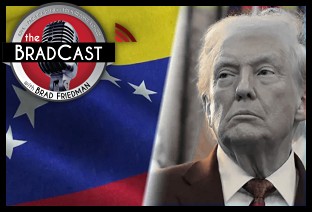 'This Isn't Close to Over': Mad King Trump in Venezuela (and Beyond): 'BradCast' 1/14/26
'This Isn't Close to Over': Mad King Trump in Venezuela (and Beyond): 'BradCast' 1/14/26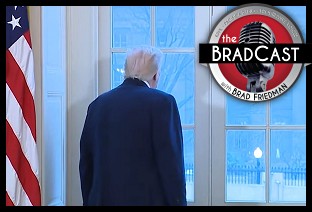 Things Getting Weirder
Things Getting Weirder 'Green News Report' 1/13/26
'Green News Report' 1/13/26 After ICE Murder in MN, Local Cops Disowning Fed Policing Practices: 'BradCast' 1/12/26
After ICE Murder in MN, Local Cops Disowning Fed Policing Practices: 'BradCast' 1/12/26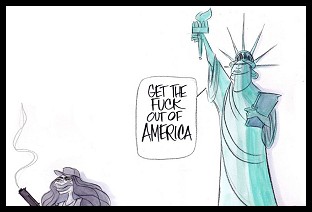 Sunday 'Ice Age' Toons
Sunday 'Ice Age' Toons Trump to Congress, Climate, U.N., Rule of Law, World: DROP DEAD - 'BradCast' 1/8/26
Trump to Congress, Climate, U.N., Rule of Law, World: DROP DEAD - 'BradCast' 1/8/26 'Green News Report' 1/8/26
'Green News Report' 1/8/26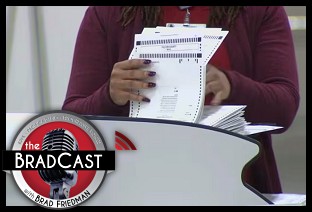 'Nonsense': Trumpers Claim 315k Fraudulent GA Votes in 2020: 'BradCast' 1/7/26
'Nonsense': Trumpers Claim 315k Fraudulent GA Votes in 2020: 'BradCast' 1/7/26 Jack Smith Testimony on Trump J6 Crimes, DOJ Weaponization: 'BradCast' 1/6/26
Jack Smith Testimony on Trump J6 Crimes, DOJ Weaponization: 'BradCast' 1/6/26 'Green News Report' 1/6/26
'Green News Report' 1/6/26 Trump's War on Venezuela is About Ego, Power, Creation of 'Alien Enemies': 'BradCast' 1/5/26
Trump's War on Venezuela is About Ego, Power, Creation of 'Alien Enemies': 'BradCast' 1/5/26 Sunday 'Peace President' Toons
Sunday 'Peace President' Toons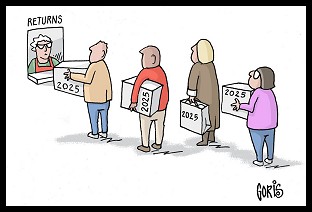 Sunday 'Many Happy Returns' Toons
Sunday 'Many Happy Returns' Toons Have a Holly Jolly Somehow
Have a Holly Jolly Somehow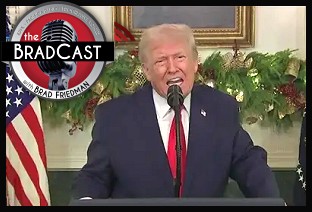 Old Man Shouts at People from WH for 20 Minutes: 'BradCast' 12/18/25
Old Man Shouts at People from WH for 20 Minutes: 'BradCast' 12/18/25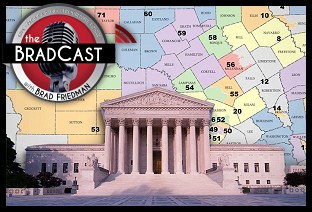 SCOTUS' How-To on Gerrymandering on 'Eve' of Election Year: BradCast' 12/17/25
SCOTUS' How-To on Gerrymandering on 'Eve' of Election Year: BradCast' 12/17/25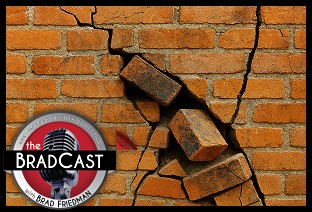 Bricks in the Wall: 'BradCast' 12/16/25
Bricks in the Wall: 'BradCast' 12/16/25 'This One Goes to 11': Weekend of Violence, Murder of Rob Reiner: 'BradCast' 12/15
'This One Goes to 11': Weekend of Violence, Murder of Rob Reiner: 'BradCast' 12/15 Trump Now Losing One Battle After Another: 'BradCast' 12/11/25
Trump Now Losing One Battle After Another: 'BradCast' 12/11/25 Dems Continue Stunning 2025 Election Streak: 'BradCast' 12/10/25
Dems Continue Stunning 2025 Election Streak: 'BradCast' 12/10/25 Petrostates and Propa-gandists Undermining Climate Science: 'BradCast' 12/9/25
Petrostates and Propa-gandists Undermining Climate Science: 'BradCast' 12/9/25
 VA GOP VOTER REG FRAUDSTER OFF HOOK
VA GOP VOTER REG FRAUDSTER OFF HOOK Criminal GOP Voter Registration Fraud Probe Expanding in VA
Criminal GOP Voter Registration Fraud Probe Expanding in VA DOJ PROBE SOUGHT AFTER VA ARREST
DOJ PROBE SOUGHT AFTER VA ARREST Arrest in VA: GOP Voter Reg Scandal Widens
Arrest in VA: GOP Voter Reg Scandal Widens ALL TOGETHER: ROVE, SPROUL, KOCHS, RNC
ALL TOGETHER: ROVE, SPROUL, KOCHS, RNC LATimes: RNC's 'Fired' Sproul Working for Repubs in 'as Many as 30 States'
LATimes: RNC's 'Fired' Sproul Working for Repubs in 'as Many as 30 States' 'Fired' Sproul Group 'Cloned', Still Working for Republicans in At Least 10 States
'Fired' Sproul Group 'Cloned', Still Working for Republicans in At Least 10 States FINALLY: FOX ON GOP REG FRAUD SCANDAL
FINALLY: FOX ON GOP REG FRAUD SCANDAL COLORADO FOLLOWS FLORIDA WITH GOP CRIMINAL INVESTIGATION
COLORADO FOLLOWS FLORIDA WITH GOP CRIMINAL INVESTIGATION CRIMINAL PROBE LAUNCHED INTO GOP VOTER REGISTRATION FRAUD SCANDAL IN FL
CRIMINAL PROBE LAUNCHED INTO GOP VOTER REGISTRATION FRAUD SCANDAL IN FL Brad Breaks PA Photo ID & GOP Registration Fraud Scandal News on Hartmann TV
Brad Breaks PA Photo ID & GOP Registration Fraud Scandal News on Hartmann TV  CAUGHT ON TAPE: COORDINATED NATIONWIDE GOP VOTER REG SCAM
CAUGHT ON TAPE: COORDINATED NATIONWIDE GOP VOTER REG SCAM CRIMINAL ELECTION FRAUD COMPLAINT FILED AGAINST GOP 'FRAUD' FIRM
CRIMINAL ELECTION FRAUD COMPLAINT FILED AGAINST GOP 'FRAUD' FIRM RICK SCOTT GETS ROLLED IN GOP REGISTRATION FRAUD SCANDAL
RICK SCOTT GETS ROLLED IN GOP REGISTRATION FRAUD SCANDAL VIDEO: Brad Breaks GOP Reg Fraud Scandal on Hartmann TV
VIDEO: Brad Breaks GOP Reg Fraud Scandal on Hartmann TV RNC FIRES NATIONAL VOTER REGISTRATION FIRM FOR FRAUD
RNC FIRES NATIONAL VOTER REGISTRATION FIRM FOR FRAUD EXCLUSIVE: Intvw w/ FL Official Who First Discovered GOP Reg Fraud
EXCLUSIVE: Intvw w/ FL Official Who First Discovered GOP Reg Fraud GOP REGISTRATION FRAUD FOUND IN FL
GOP REGISTRATION FRAUD FOUND IN FL

































